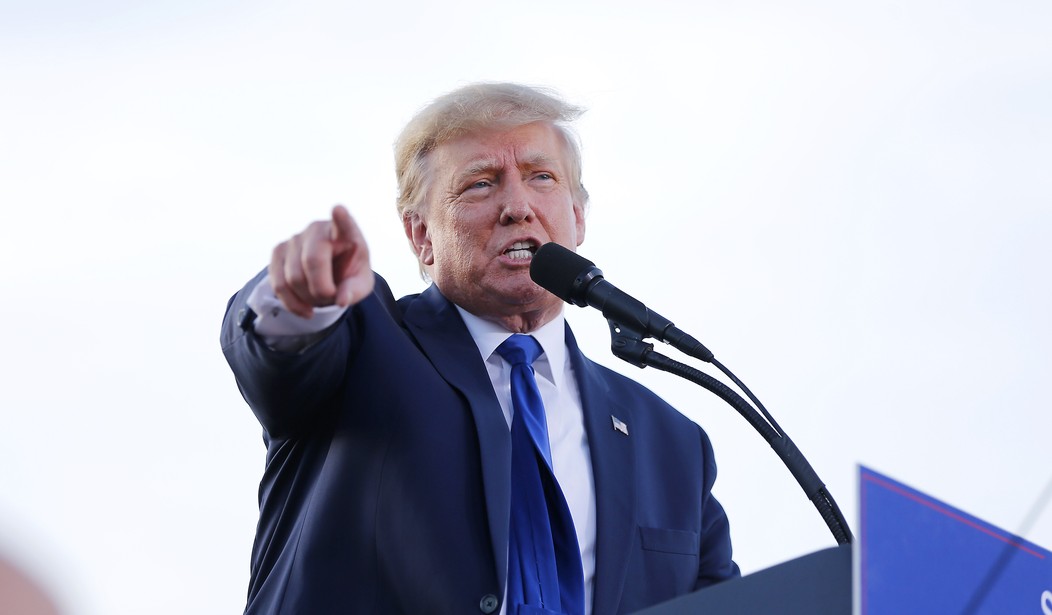Brought to you in large part out of Donald Trump’s failure to “drain the swamp” in his first term in office. Axios’ Jonathan Swan does a deep dive on what we can expect from a second Trump term, assuming he runs and can win the nomination and then the subsequent election. Swan details Trump’s “radical” plan to reshape the federal workforce, which Trump finally got around to doing in his first term when it had nearly no chance of success:
Trump signed an executive order, “Creating Schedule F in the Excepted Service,” in October 2020, which established a new employment category for federal employees. It received wide media coverage for a short period, then was largely forgotten in the mayhem and aftermath of Jan. 6 — and quickly was rescinded by President Biden.
Sources close to Trump say that if he were elected to a second term, he would immediately reimpose it.
Tens of thousands of civil servants who serve in roles deemed to have some influence over policy would be reassigned as “Schedule F” employees. Upon reassignment, they would lose their employment protections.
To say this came late is an understatement. It took Trump that long to figure out that the problem for his administration wasn’t in filling the thousands of political appointee slots — Swan puts that number at 4,000 — but in leaving them open as long as he did. Trump and his team famously took far too long in making those appointments, while at the same time Chuck Schumer did his level best to obstruct confirmations on those Trump did appoint. (Only a third of those required Senate confirmation.)
At the time and especially in 2017, the argument from the White House was that leaving those positions open was part of their drain-the-swamp strategy. However, as people repeatedly warned them, the actual effect of leaving those positions open was to remove supervision from the swamp rather than drain it. The “swamp” that afflicts Republican presidents isn’t comprised its political appointees but of careerists with activist impulses who have to answer to the appointees, unless the administration never gets around to filling those slots in the first place.
It was that class, protected by civil-service laws, that Schedule F targeted. And for good reason, as Swan perhaps inadvertently reveals:
An initial estimate by the Trump official who came up with Schedule F found it could apply to as many as 50,000 federal workers — a fraction of a workforce of more than 2 million, but a segment with a profound role in shaping American life.
Regardless of whether one wants to see Trump return in 2024, this is a very big problem in a self-governing republic. Tens of thousands of federal bureaucrats — comprising only 2% of the overall federal workforce, mind you — play a “profound role in shaping American life” but don’t effectively answer to the officials elected by American voters? Any government official with a “profound role” in governing Americans should fall outside of civil-service protections and serve at the pleasure of elected officials. The other 98% of federal employees can keep their civil-service protections.
The big question isn’t whether this is Trump’s plan. It’s why it shouldn’t be every Republican candidate’s plan going into the 2024 election cycle. The Wilsonian model of governance by elite “experts” has been thoroughly discredited over the past century, and perhaps especially after the catastrophic leadership of the expert class through the pandemic. It’s time to get back to direct self-governance through elected legislatures and executives instead. Schedule F looks like a very good way to get that movement rolling.
However, one has to wonder whether Trump himself is the best candidate to implement such a plan. His administration proved remarkably inept at vetting its higher-level nominees, and relatively AWOL at appointing lower-level positions at all. Implementing Schedule F would require a lot more than an executive order — it would also need a detail-oriented, granular president and administration to hire and oversee those 50,000 positions to ensure that administration policy got implemented properly and ensure it worked as intended. Trump is neither detail-oriented nor granular, and neither were the people that Trump put in the West Wing, especially in its first two years. The implementation of Schedule F in a Trump administration would likely lead not to a MAGA swarm in the upper reaches of the bureaucracy, but instead even larger and deeper gaps that would leave the other 98% of the federal bureaucracy to operate even more on auto-pilot and on permanent chaos mode.
Swan thinks Trump has already figured that out:
No operation of this scale is possible without the machinery to implement it. To that end, Trump has blessed a string of conservative organizations linked to advisers he currently trusts and calls on. Most of these conservative groups host senior figures from the Trump administration on their payroll, including former Chief of Staff Mark Meadows.
No operation of this scale would be possible in a Trump organization, period. Trump runs his operations by top-down command, not in the kind of distributed-power arrangement necessary for such a plan to work. Trump does not like anyone competing for or encroaching on his own power. He might be working with these groups to curry favor with them, but his track record shows that Trump does not share or delegate power once it’s granted to him. It’s a big asset in the private sector when running a family-owned empire where personal relationships define loyalty, but it doesn’t work when dealing with conglomerated power and interests.
It’s still a good plan. Let’s hope the next Republican president is adept enough to implement it on Day One rather than Month 45, and has the self-discipline to focus on detail in distributed-power systems to see it through to success.








Join the conversation as a VIP Member